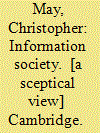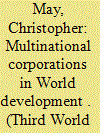| Srl | Item |
| 1 |
ID:
049302


|
|
|
|
|
| Publication |
Cambridge, Polity Press, 2002.
|
| Description |
xi, 189p.
|
| Standard Number |
0745626858
|
|
|
|
|
|
|
|
|
|
|
|
Copies: C:1/I:0,R:0,Q:0
Circulation
| Accession# | Call# | Current Location | Status | Policy | Location |
| 045702 | 306.42/MAY 045702 | Main | On Shelf | General | |
|
|
|
|
| 2 |
ID:
154788


|
|
|
|
|
| Summary/Abstract |
In light of the 2014 Ecuador-sponsored resolution at the UN Human Rights Council to examine the link between Transnational Corporations and Human Rights, in this paper I review the first major discussion at the United Nations of the role of multinational corporations. The report on Multinational Corporations in World Development (1973) for the UN Department of Economic and Social affair launched the (then) new UN Centre on Transnational Corporations. I examine the report in some detail, compare and contrast this with the Ecuadorian resolution from 2014, and reflect on the continuities and changes in attempts to regulate the conduct of global corporations over the 40 years between these two moments.
|
|
|
|
|
|
|
|
|
|
|
|
|
|
|
|
| 3 |
ID:
081209


|
|
|
|
|
| Publication |
2008.
|
| Summary/Abstract |
Although analysis in IR and IPE has increasingly started to focus on non-state actors and the information society, the role of the legal architecture of the Internet has been relatively under-analysed in terms of the structural power around communication interfaces. In this article I suggest the work of Lewis Mumford offers a useful lens for thinking about the political economy of technological change in an information society. I set out the role of intellectual property rights as the legal form of the global information society, and suggest a major challenge to this legal form is the idea of 'openness', specifically in the realm of open-source and/or free software. I examine this issue in the realm of (so-called) informational development, where major proprietary players (predominantly Microsoft) have been confronted by an increasingly vibrant open-source alternative. The open-source and free-software movements can be analysed as an emerging example of a globalised 'double movement', seeking to re-embed the tools of informational development in a societal realm of information, establishing in Mumford's terms a 'democratic technics' as a reaction to the programme of information and knowledge commodification spurred by the TRIPs agreement.
|
|
|
|
|
|
|
|
|
|
|
|
|
|
|
|